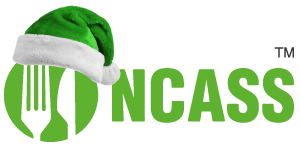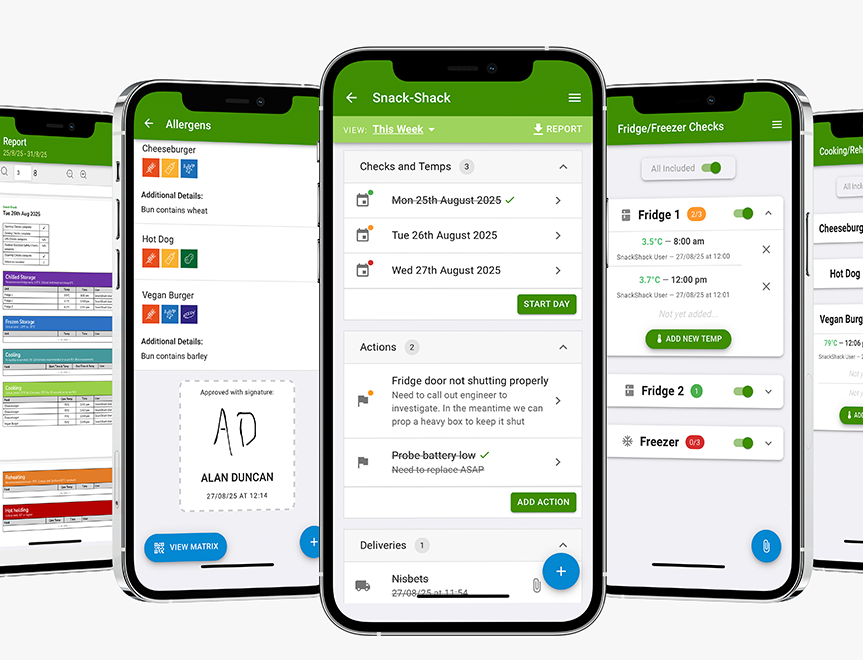When an Environmental Health Officer carries out a food hygiene inspection at your business, they are looking to ensure that you are operating in line with legal food hygiene and safety requirements and that the food you are producing or selling is safe for consumers to eat – one of the areas EHOs will be looking at is how a food business manages food allergens.
An Environmental Health Officer will want to observe that the business is operating in a compliant, safe and legal way. The effective management of allergens is a central factor in this, so evidence of this in practice will be sought. In particular, EHOs will be looking to identify that the presence of food allergens and the risk of cross contamination is properly managed within food preparation area
In addition, they will be looking to ensure that the business can provide accurate allergen information about the foods they prepare and sell and have a clear means of communicating specific orders/ requests relating to food allergies between staff and customers.
They will likely ask the business and their staff to talk them through how they would deal with a specific request for information made by a customer or how they would go about preparing an order for someone with a food allergy.
During a routine inspection EHOs will attempt to understand how you effectively manage the following:
Allergens Presence:
- The identification of allergens in ingredients used and menu items that are produced, including checks on food deliveries and an awareness that suppliers may substitute or change ingredients.
- Staff training on food allergen awareness, how to react promptly and deal with food allergies and emergency situations etc.
- Clear communication and in-house procedures for providing information to consumers, dealing with specific requests and providing suitable food orders. For example, compiling an allergen matrix or alternative written system, providing signage for customers on service counters, menus and website.
- Clear Product labelling with allergen ingredients highlighted on prepacked foods, an awareness of the Natasha’s Law Requirements for Prepacked for Direct Sale (PPDS) and implementing these for relevant products.
Allergen Cross Contamination:
- Effective cleaning of food contact surfaces and equipment, taking place to minimise the presence of food allergens – including a two-stage cleaning process, and where ever possible the use of disposable use once cleaning cloths/paper towel.
- Clear separation of specific foods during preparation, service and delivery. For example,
- Separate storage and labelling of allergen ingredients and products.
- Where applicable the use of separate designated chopping boards, work surfaces, knives and utensils etc. and planning a suitable space where specific orders could be prepared.
- Consideration for how more complex equipment such as deep fat fryers, toasters, food mixes etc and whether or nor they are suitable for preparing specific orders depending on their other uses/contact with food allergens.
- Personal hygiene measures – steps taken by food handlers to wash hands, change gloves and protective clothing.
- Awareness of food born allergens. For example, using flour, nut powders and spice mixes that remain in the air or are easily spread onto other surfaces, equipment, requiring extra care or prevention.
Food Safety Management System
EHOs will expect to see relevant allergen control measures documented in the food safety management system. For NCASS members this will mean the details outlined in their Food Safety Risk Assessments. These can be completed and updated within the online risk assessment tool via the Member Dashboard.
To assist with the management of food allergens, to keep consumers safe whilst demonstrating compliance with the legal requirements, NCASS have included generic control measures within the risk assessment templates for the following hazards:
- Allergen Presence
- Allergen Cross Contamination
Members must familiarise themselves with the control measures in the risk assessment, adapt them where necessary so they are applicable to their business and then ensure they are properly implemented.
Members are advised to have copies of their Food Safety Risk Assessments in their Safety Management System folder so they are readily available to view and to support their routine food safety inspection. An EHO will likely want to review them.
NCASS offers a training course on Allergen Awarenes which is designed to provide a comprehensive understanding of allergens in the kitchen and how to manage them effectively. It is suitable for all staff from servers, food handlers to managers and business owners.
It is advisable to include proof that staff have undertaken Allergen Awareness training within the Safety Management System.
Is the business inclusive?!
Whilst it is not a legal requirement to provide specific ‘allergen free dishes’ as part of the menu offering, it is a really good idea to do so. It demonstrates the businesses willingness to be inclusive to all consumers and could see the business gain a new consumer base, offering a Unique Selling Point (USP) in their local area. In many cases it can be achieved, it just requires a little more planning and preparing, but this will be worth it.
Try walking in the shoes of someone who has a food allergy or intolerance – think about what it would be like to be continuously limited by the lack of options, unable to eat out with family and friends, enjoy special occasions etc. If in their shoes wouldn’t you want to enjoy dining out or enjoying the food offering at a festival/ music event, just like everyone else?!
Consider what other businesses in the local area are offering in terms of supporting safe allergen free options – could you be the only one? Why not develop your business to embrace those customers with food allergen and intolerances. It could be a really great thing! Afterall it’s not only the EHO who you want to see leave happy!
If you want to learn more about allergen management as well as preparing for the visit of an EHO, NCASS has plenty more resources on both:
For more on preparing accurately for your EHO visit our preparation page and also you can download our EHO Inspection Checklist guide for free.
To find all of our allergen related content and resources, visit our Allergen Hub.






 Featured Training
Featured Training
OUR MEMBERSHIP
We're here to help make your catering business a success. Whether that be starting up or getting on top of your compliance and marketing. We're here to help you succeed.
Want our latest content?
Subscribe to our mailing list and get weekly insights, resources and articles for free
Get the emails